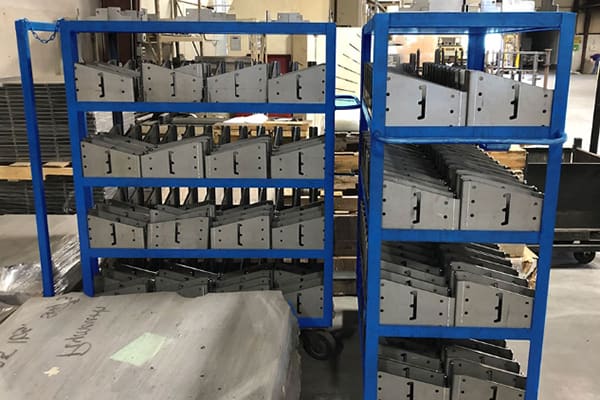Metal trolleys have become indispensable in modern manufacturing environments, revolutionizing material handling and significantly enhancing operational efficiency. These versatile carts are engineered to streamline workflows, optimize logistics, and improve overall productivity across various industries.
The Role of Metal Trolleys in Manufacturing
In manufacturing facilities worldwide, metal trolleys play a crucial role in transporting raw materials, work-in-progress items, and finished products efficiently. These trolleys are designed with sturdy metal frames and durable wheels, capable of withstanding heavy loads while maintaining stability and maneuverability on factory floors.
Key Benefits and Features
- Enhanced Workflow Efficiency: Metal trolleys enable smooth and organized movement of goods throughout the production process. By reducing the need for manual lifting and carrying, they minimize downtime and labor costs.
- Optimized Space Utilization: Their design allows for compact storage and efficient space utilization in warehouses and production areas. Metal trolleys can be stacked or nested when not in use, saving valuable floor space.
- Customization for Specific Needs: Manufacturers can customize metal trolleys to meet specific requirements such as load capacity, dimensions, and ergonomic features. This flexibility ensures they integrate seamlessly into existing workflows.
- Durability and Longevity: Constructed from robust materials like stainless steel or aluminum, metal trolleys offer durability and resistance to corrosion, ensuring a longer service life even in demanding industrial environments.
Applications Across Industries
Metal trolleys find extensive use in various manufacturing sectors:
- Automotive Industry: Used for transporting parts and components along assembly lines, improving assembly speed and efficiency.
- Electronics Manufacturing: Facilitate the movement of delicate electronic components and materials between workstations, reducing handling damage and improving workflow reliability.
- Food and Beverage Production: Ensure hygienic transport of ingredients, packaging materials, and finished goods, meeting strict industry standards.
Technological Advancements
Recent advancements in metal trolley technology have further enhanced their utility:
- Integration with Automated Systems: Metal trolleys are increasingly compatible with automated guided vehicles (AGVs) and conveyor systems, facilitating seamless material flow in smart factories.
- Digital Tracking and Inventory Management: Some metal trolleys are equipped with RFID tags or barcode scanners for real-time tracking of inventory, enhancing inventory management efficiency.
Future Trends
Looking ahead, the evolution of metal trolleys continues with innovations aimed at sustainability and automation. Manufacturers are exploring lighter materials and energy-efficient designs to reduce environmental impact while improving operational efficiency.
Conclusion
In conclusion, metal trolleys represent a cornerstone of efficient manufacturing operations, offering robustness, adaptability, and significant cost savings. As industries evolve, their role in enhancing productivity and supporting lean manufacturing principles becomes increasingly vital. By investing in quality metal trolleys tailored to specific needs, manufacturers can optimize workflows, reduce operational costs, and maintain a competitive edge in the global market.
By embracing the latest advancements in metal trolley technology, manufacturers are poised to achieve greater efficiency and sustainability goals while meeting the demands of a rapidly changing industrial landscape.
Post time: 07-19-2024




